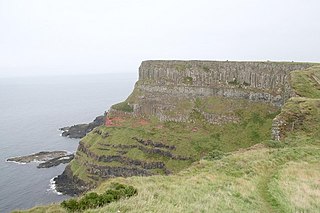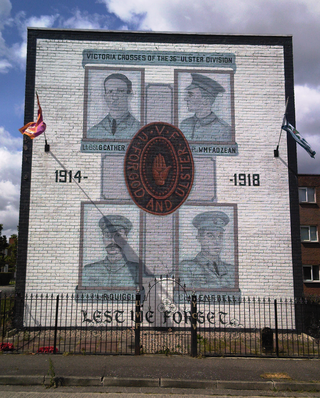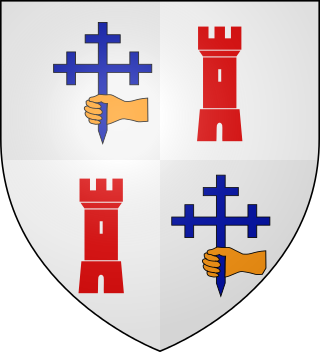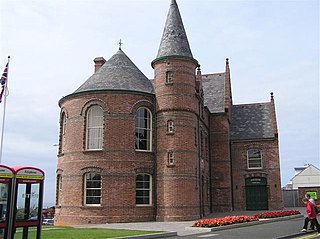
Bushmills is a village on the north coast of County Antrim, Northern Ireland. Bushmills had a population of 1,247 in the 2021 Census. It is located 60 miles (97 km) from Belfast, 11 miles (18 km) from Ballycastle and 9 miles (14 km) from Coleraine. The village owes its name to the River Bush and to a large watermill that was built there in the early 17th century. It is home to the Old Bushmills Distillery, which produces Irish whiskey, and is near the Giant's Causeway.

North Antrim is a parliamentary constituency in the United Kingdom House of Commons. The current MP is Ian Paisley Jr of the DUP.

Benbane Head, or Benbane, is the northernmost point of mainland Northern Ireland. It is in County Antrim, near the Giant's Causeway, which lies between Causeway Head and Benbane Head. The nearest settlements are Bushmills and Portballintrae.

The Giant's Causeway and Bushmills Railway (GC&BR) is a 3 ft narrow gauge heritage railway operating between the Giant's Causeway and Bushmills on the coast of County Antrim, Northern Ireland. The line is two miles (3.2 km) long.

Robert Quigg was an Irish recipient of the Victoria Cross, the highest and most prestigious award for gallantry in the face of the enemy that can be awarded to British and Commonwealth forces. The award was made for his actions during the Battle of the Somme in the First World War.

The Old Bushmills Distillery is an alcohol distillery in Bushmills, County Antrim, Northern Ireland, founded in 1784 and owned by Proximo Spirits. Bushmills Distillery uses water drawn from Saint Columb's Rill, which is a tributary of the River Bush. The distillery is a popular tourist attraction, with around 120,000 visitors per year. It produces the Bushmills brand of Irish whiskey.

Clan Macnaghten, Scottish Gaelic: MacNeachdain, is a Scottish clan.
Balnamore is a small village in County Antrim, Northern Ireland. It is within the townland of Ballynacree-Skein and lies 3 km west of Ballymoney. It is part Causeway Coast and Glens District Council. Historically it was known as Ballinamore.

Portballintrae is a small seaside village in County Antrim, Northern Ireland. It is four miles east of Portrush and two miles west of the Giant's Causeway. In the 2011 Census, Portballintrae had a population of 601, a decline of 18% compared to 2001. It lies within the Causeway Coast and Glens District Council area.
Ballybogy, or Ballybogey, is a small village and townland in County Antrim, Northern Ireland. It is located 7 km north-north-west of Ballymoney and 7 km east of Coleraine, lying within the Causeway Coast and Glens district. It is known as Boggie in Scots. It had a population of 539 people
Longkesh is a small village in County Antrim, Northern Ireland, near Lisburn. In the 2001 Census it had a population of 201 people. It is situated in the Lisburn City Council area.

Straid is a small village in County Antrim, Northern Ireland, about three miles east of Ballyclare, and about six miles inland from Carrickfergus. It lies at the centre of the townland of Straidlands, in the Civil Parish of Ballynure within the Antrim and Newtownabbey Borough Council area, and in the former barony of Belfast Lower. The village has a congregational church, an Orange hall, and a primary school.

The Workman-Macnaghten, later Macnaghten Baronetcy, of Bushmills House in the County of Antrim, is a title in the Baronetage of the United Kingdom. It was created on 16 July 1836 for Francis Workman-Macnaghten, a Judge of the Supreme Court of Madras between 1809 and 1815 and of Calcutta between 1815 and 1825. Born Francis Macnaghten, he assumed the additional surname of Workman in 1809. The fourth Baronet discontinued the use of the surname Workman. In 1887 he was created a Lord of Appeal in Ordinary as Baron Macnaghten, of Runkerry in the County of Antrim. Both the sixth and seventh Baronets were killed in the First World War. Also William Hay Macnaghten was created a Baronet on 1840, but the Baronetcy became extinct upon his murder.

The River Bush is a river in County Antrim, Northern Ireland. The River Bush is 33.5 miles (53.9 km) long. The river's source is in the Antrim Hills at 480m. From there the river flows northwest, with a bend at the town of Armoy. It then flows west, passing through Stranocum, and then bends north, passing through Bushmills before reaching the sea at Portballintrae on the North Antrim coast. It flows through a fertile valley devoted to grassland-based agriculture with limited arable cropping. The underlying geology is basalt and the water is slightly alkaline with magnesium making an unusually large contribution to total hardness. The river supports indigenous stocks of Atlantic salmon and brown trout. Saint Columb's Rill, which is a tributary of the river, is the source of water used for distilling Bushmills whiskey.

The River Dun, also known as the Glendun River is a river in County Antrim, Northern Ireland. It runs through Glendun, one of the nine Glens of Antrim. The river is named after its brown colour, which comes from the peat bogs at its source on the slopes of Slievenanee on the Antrim Plateau. The source of the river is a few hundred metres from that of the River Bush, which flows north-east to meet the sea at Bushmills. Cushendun is a small coastal resort town lying at the mouth of the River Dun and Glendun.

Causeway Coast and Glens is a local government district covering most of the northern part of Northern Ireland. It was created on 1 April 2015 by merging the Borough of Ballymoney, the Borough of Coleraine, the Borough of Limavady and the District of Moyle. The local authority is Causeway Coast and Glens Borough Council.
Elliot Macnaghten (1807–1888) J.P, also known as also known as Elliot Workman-Macnaghten, was a British official of the East India Company. He was its Chairman in 1855.
Edmond Alexander MacNaghten was an Irish Tory politician from County Antrim. He sat in the Irish House of Commons from 1797 until the Act of Union in 1800, and then in the House of Commons of the United Kingdom from 1801 to 1830.

Portrush Town Hall is a municipal structure in Mark Street, Portrush, County Antrim, Northern Ireland. The structure, which is used as an events venue, is a Grade B+ listed building.














